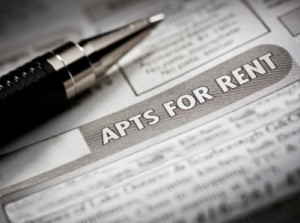Posted by Teresa on April 22, 2011 under Lease and Rental Agreements, Screening and Background Checks | 
 When a landlord leases a rental property to two or more tenants, and one wants to move before the lease is up, what is the best way to proceed?
When a landlord leases a rental property to two or more tenants, and one wants to move before the lease is up, what is the best way to proceed?
Some landlords make the mistake of splitting a $1000 monthly rent so that each tenant is responsible for $500—and accepting that amount from each tenant, month after month. When one tenant leaves, they worry about finding another tenant so that the remaining one can continue paying their $500.
However, the tenants are together responsible for ensuring the rent is paid in full; therefore, when one tenant moves out, the remaining tenant or tenants must continue paying the full rent on time every month. For example, if the lease runs through September and a tenant moves out in June, both tenants are still responsible for full rent until the end of September—whether that means the tenant who moved keeps paying their half on a rental they no longer live in, or the remaining tenant pays the entire rent.
In most cases, the lease will be in the names of each tenant, and each tenant is responsible for upholding its terms—including whatever penalties are in place for breaking the lease early. It is up to the tenants to work out how the full rent will be paid until the end of the lease.
Another issue some tenants raise is the security deposit. Would a tenant who is leaving early be entitled to a pro-rated portion of the security deposit they paid at move-in? Most landlords would say “no way.” It is standard practice to tie the security deposit to the rental unit. Only the tenants still living in the unit at the end of the lease would be eligible for any return of the security deposit.
Remember, if your tenant finds a new roommate, follow your standard procedures for any new tenant. This should include a lease application, thorough tenant screening and credit check, and checking all work and former rental references.
Posted by Teresa on April 19, 2011 under Rents and Deposits | 
 In a perfect world, every tenant would pay their rent online a day or two in advance, so that the funds are automatically transferred into the landlord’s preferred bank account. In this fantasy world, no rent checks, money orders, mail issues or late payments would ever need to be dealt with. Landlords know this will never happen!
In a perfect world, every tenant would pay their rent online a day or two in advance, so that the funds are automatically transferred into the landlord’s preferred bank account. In this fantasy world, no rent checks, money orders, mail issues or late payments would ever need to be dealt with. Landlords know this will never happen!
In reality, tenants come with a wide assortment of likes, dislikes and financial challenges. Some refuse to keep a checking account (or can’t get a bank to open one). Others are not computer-savvy and will be unable to navigate an online rent payment system. Online payments may be difficult for the the elderly or disabled to deal with. Still other tenants just prefer to deal in cash.
Depending on your rental property and typical tenant, it might be unrealistic to demand that all tenants mail you a check or pay rent online. Making it easier for your tenants to pay their rent on time by offering options that work for everyone might take some effort—but it can pay off. Just make sure that it works for you, as well.
Some options to consider for tenant rent payments:
- Dropping off cash or money orders on-site: this is not a good idea, as it invites theft!
- Set up a rent-receiving bank account and distribute deposit slips to tenants: Indicate each name on the slip, and tenants make deposits directly to the account. The landlord can track deposits online, and usually view and print a copy of the deposit slip.
- Collect rent personally: Many landlords prefer to pick up rent payments themselves because it gives them a chance to check on the property and have some face-to-face tenant time. It can also prevent late payments, since the tenant either has to pay up or explain why they can’t. However, this can be dangerous—especially when cash is involved.
- Provide self-addressed envelopes: Whether you provide the stamps or not is up to you; many tenants find it easy to drop a money order or check in an envelope that is ready to go. It may seem like going too far to make things easier for the tenant, but if it helps your cash flow—why not?
- Direct deposit or electronic transfer: In this situation, the tenant agrees to automatic electronic transfer from their bank account to yours on a specific day of the month. Automatic bill pay is becoming the way people pay bills, so why not rent as well?
Creative rent payment solutions can help keep your tenants paying on time–and keep you in the black!
Posted by Teresa on April 8, 2011 under Landlord Tips, Marketing for Landlords | 
 How a landlord advertises rental property is the first step in signing a lease with the best possible tenant. If you want a tenant who pays rent on time, takes care of your property and doesn’t cause any trouble, you can start that process when you place your ads.
How a landlord advertises rental property is the first step in signing a lease with the best possible tenant. If you want a tenant who pays rent on time, takes care of your property and doesn’t cause any trouble, you can start that process when you place your ads.
What to Include in a For Rent Ad
First you have to decide the basics: how much rent you’ll charge, the length of the lease, how many people your rental unit can accommodate, whether pets will be allowed and the requirements tenants must meet to qualify for a lease.
Once you’ve determined these factors, you can write your ad. Include the following:
- Number of bedrooms and bathrooms.
- Location.
- Special features, like hardwood floors, washer and dryer, water view, or proximity to trails or parks.
- Size and type of pets allowed, if any.
- Website to view photos and find additional information.
- How to contact you. Include a mobile number.
- The rent, security deposit and any other requirements that will help you screen out less-than-desirable tenants. For example, let readers know up front that you will be ordering tenant credit checks and background checks on all applicants.
What not to include:
Any language that can be considered discriminatory. Don’t mention that your rental unit is best for singles, families, elderly, young people, or those of a certain religion. Even mentioning that it’s located near a church can be interpreted that you expect to rent to church-goers.
Once you’ve placed the ad, try not to allow calls to roll to voice mail. People are impatient these days and may not leave a message or call you back.
Posted by Teresa on April 6, 2011 under Lease and Rental Agreements | 
 The utilities section in a property lease is one of the most important. It stipulates who is responsible for the utility bills associated with the rental property. Failing to specify which utilities the tenant will be responsible for can cause headaches and financial loss to the landlord.
The utilities section in a property lease is one of the most important. It stipulates who is responsible for the utility bills associated with the rental property. Failing to specify which utilities the tenant will be responsible for can cause headaches and financial loss to the landlord.
Determining who’s responsible for the unit’s utilities—and having a signed agreement—is important because it protects both the landlord and the tenant. Each utility company has different ways of handling rental properties. Once you know how things work in your area, decide which arrangement works best for your situation; there are many options, including:
- In single-family rental houses, tenant pays all utilities directly to the provider
- Landlord pays for utilities that can result in liens against property if unpaid
- Tenant pays for everything except sewer and water
- Landlord pays utilities and has tenants reimburse him
- Landlord pays only for utilities the building owner is responsible for
- Tenants pay for anything that is metered to their unit; utilities with shared meters (usually water and sewer) are paid by landlord and built into the rent
- Landlord pays for garbage and recycling pickup only
Once you determine which arrangement works best, draft your this section of the rental agreement stating that the tenant is responsible for all utilities except for those (specify them) the owner will be paying. Also include language that the tenant agrees to make the payments through the term of the lease and nonpayment will be considered a breach of the agreement. State that any past due utility bills may be paid by the owner and will be charged to the resident, along with applicable fees.
As part of your due diligence before you sign the lease, check with the utility companies to be sure the tenant qualifies for an account in his or her name. Outstanding bills may prevent this—if you sign a lease with a tenant who cannot get the utilities in their name, you’ve just wasted a lot of time working with a tenant who won’t be moving into your rental property.
Finally, most landlords we know have utilities revert to their name between tenants.
Posted by Teresa on April 1, 2011 under Landlord and Tenant FAQs | 
 Question: A landlord accepts applications from three potential roommates for a three-bedroom rental unit. The first two check out fine. The third proves to be difficult and unpleasant, even borderline verbally abusive, in all her interactions with the landlord. He decides to not even order a tenant credit report and rejects all three applicants. Is the landlord allowed to refuse a tenant for reasons other than a credit score?
Question: A landlord accepts applications from three potential roommates for a three-bedroom rental unit. The first two check out fine. The third proves to be difficult and unpleasant, even borderline verbally abusive, in all her interactions with the landlord. He decides to not even order a tenant credit report and rejects all three applicants. Is the landlord allowed to refuse a tenant for reasons other than a credit score?
Answer: Of course. A landlord may decline an applicant for any reason other than those covered under the Fair Housing Act, which bars discrimination based on race, color, national origin, religion, sex, familial status (including children under the age of 18 living with parents or legal custodians), pregnant women, elderly people, people securing custody of children and handicap (disability).
A landlord does not have to disclose reasons for rejecting a tenant—you can simply say a more qualified applicant was approved. (Under the Fair Credit Reporting Act or FCRA, a letter must be sent to an applicant if credit is declined, including for rental housing)
Question: A landlord advertises a rental property using the following language:
For Rent. 3BR apartment, 3rd floor. Not suitable for kids or elderly.
Is this discriminatory?
Answer: Yes. See above: landlords may not deny housing based on family status or age. This landlord could get in big trouble for this type of ad.
Question: A landlord starts eviction proceedings after discovering a tenant has kept a cat in her apartment—contrary to the lease, which states no animals are allowed. The tenant tells the landlord that she needs the cat because it is a therapy animal. Is the landlord discriminating against the tenant based on a disability?
Answer: It often depends on where the rental property is located. In most areas, a tenant must provide proof that the therapy or companion animal is necessary for the individual’s mental health or stability. This is usually a statement by a medical provider. The Americans with Disabilities Act (ADA) does not include companion, emotional support or therapy animals, because they have not been trained to perform tasks that benefit a disabled person.
 When a landlord leases a rental property to two or more tenants, and one wants to move before the lease is up, what is the best way to proceed?
When a landlord leases a rental property to two or more tenants, and one wants to move before the lease is up, what is the best way to proceed?



